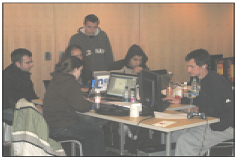 |

|
 |
From Left: Winning team members Brian Doyle, Jenny Lees, Phillip Weisberg, Derek Willemstein, Alexander Tran, and Mike Couture hard at work during the Game Jam. |
|
For Immediate Release
October 22, 2008
Contact: Michael Pack
301.403.4594 or at PackML@umd.edu
COLLEGE PARK, Md. -- A seven member team including University of Maryland?s Center for Advanced Transportation Laboratory (CATT Lab) employees Phillip Weisberg, Jenny Lees, and Mike Couture were named the winners of the first ever Games for Health Game Jam held at the University of Baltimore. Their team, which also included students from the University of Baltimore, competed against six other teams of professional game developers, professors, and students. The 24-hour coding marathon challenged the teams of designers, programmers and artists to work round-the-clock to create small, playable games related to health that demonstrate innovative ideas in short amounts of time. At the conclusion of the competition, each team was critiqued and judged by a panel of professional game developers and educators.
?Our team created a series of mini-games that teach players about various ways to control their daily caloric intake and exercise,? said CATT Lab 3D Development Manager Phillip Weisberg. ?The overall idea was to inform players that by taking many small steps, they could create a long-term, positive change in their health.?
The games educate players about food choices and exercise in an entertaining way. One game challenges players to cook both healthy and tasty meals. The other game depicts you trying to escape your boss at the end of the day in a multi-story office building. Players are forced to make choices about taking evasive action (using an elevator or the stairs) to avoid their boss. Finding the right balance is both challenging and entertaining.
Games for Health is a project produced by The Serious Games Initiative, which was founded by at the Woodrow Wilson International Center for Scholars. The Serious Games Initiative utilizes cutting edge games and game technologies to a range of public and private policy, leadership, and management issues.
?The goal of Games for Health is to use all the resources that exist in the greater game development field to provide solutions to health and health care challenges,? said Ben Sawyer, co-founder of the Games for Health Project. ?Experimental game jams, which owe their heritage to demo jams in Europe, have become popular events in the past five years. We want to tap into the incredible creativity these jams foster and put that to use in health domain.?
CATT Lab employees are already involved in several serious gaming applications including their development of the I-95 Corridor Coalition?s 3D Virtual Incident Management Training System.
The winning team received, in addition to bragging rights, a cash prize from the Games for Health Project. All games created during the competition along with photos and a full report will be made available on the Games for Health website within the next couple of weeks.
About CATT
The Center for Advanced Transportation Technology (CATT) in the A. James Clark School of Engineering Department of Civil and Environmental Engineering at the University of Maryland, College Park, was created in order to respond to the significant changes brought about by increasing use of advanced technologies in the transportation field. A permanent staff of ITS professionals and affiliated faculty of the Department of Civil Engineering supports CATT. All offer extensive knowledge and experience in the areas of ITS technology, traffic engineering and control, systems analysis, and operations research. Visit CATT on the web at www.catt.umd.edu.
October 22, 2008
|

